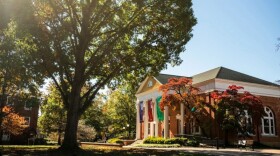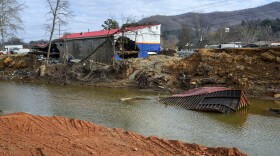A new political party is close to getting on the ballot in North Carolina, but not without facing some hurdles at the State Board of Elections.
And it may not have a presidential candidate next year.
The No Labels party wants the option to run an alternative candidate if next year’s election becomes a rematch between President Joe Biden and former President Donald Trump. The new party’s leaders include Ben Chavis — a Democrat and civil rights leader who’s from North Carolina — and former Republican Gov. Pat McCrory.
McCrory says he’s not leaving the GOP and he’s hoping someone other than Trump gets the nomination. But he likes the mission of No Labels.
"You're talking to someone who has been called a moderate, who's been called a right-wing extremist, who's been called a left-wing RINO," said McCrory, who ran unsuccessfully for U.S. Senate last year. "And frankly, none of those labels fit me. In fact, I think most people in America, and most people in North Carolina, look at each issue on its own. And on some issues, you might be moderate on some issues, you might be more conservative on other issues, you might be more liberal. But we're labeling people overall based upon maybe one or two issues, which to me stifles conversations more than anything else."
No Labels will make a decision after next year’s Super Tuesday primaries on whether it will run a presidential candidate in 2024. McCrory and other leaders are looking closely at polling that shows more than 60% of voters don’t want Trump or Biden.
"We anticipate if Biden and Trump are the ticket, and the surveys remain the same, we're going to get two extremely good candidates — most likely one Democrat and one Republican — to show the American people that we can work together during divided times," McCrory said.
But in order to get those candidates on the ballot for November 2024, No Labels has to become an officially recognized political party well ahead of the election. North Carolina requires new political parties to get nearly 14,000 voters to sign a petition.
No Labels hired a firm to gather signatures across the state. Earlier this month, the State Board of Elections announced that it has exceeded the requirement by about a thousand signatures.
But elections board chairman Alan Hirsch — a Democrat appointed by Gov. Roy Cooper — says he’s concerned that No Labels might not have met a requirement that the signature gatherers inform voters about the "purpose" of the new party.
The party provided training materials that included talking points about its goals. Hirsch says he wants more proof, and he delayed a vote on recognizing No Labels until next month.
"Unfortunately, from my point of view, I am also concerned that this is not sufficient, in particular because this is an example," Hirsch said during the July board meeting. "That’s how they describe it. So there’s no other examples of training materials and so on."
McCrory says No Labels has followed the legal requirements, and the two major political parties are trying to add new hurdles.
"We're going to get on the ballot in North Carolina, we've met the requirements, and we're not going to put up with this delay much longer," McCrory said. "You can't make up the rules as you go along."

Political scientist Chris Cooper says other states make it easier for third parties to get on the ballot.
"North Carolina is sort of a notoriously difficult state for ballot access," said Cooper, the Director of the Public policy Institute at Western Carolina University. "States vary widely as you would imagine, and we are definitely on the stricter end, and we're seeing the effects of that right now."
Cooper says No Labels could draw votes away from either political party, and the effect will depend on who they nominate for president. A moderate Democrat could attract Biden voters, but a moderate Republican might entice voters who'd otherwise back Trump.
For next year’s races, No Labels would nominate its candidates at a convention — rather than an open candidate filing period and primary — and McCrory says it’s not interested in running candidates in other races like governor.
But if it gets enough votes next year to remain a recognized party in North Carolina, running for office under the No Labels banner could prove popular for unaffiliated candidates later.
That’s because the state makes it extremely difficult to get on the ballot as an unaffiliated voter with thousands of petition signatures required. Filing for office with a political party label simply requires paperwork and a small fee.
That means candidates in future elections might run for local offices by registering as a member of the No Labels party, Cooper says. A number of local government races have been shifting from nonpartisan to partisan contests.
"Unaffiliated candidates have to go somewhere. Might they go to No Labels?" Cooper said. "So, the effect is going to be felt at the presidential level, but perhaps more at the very lower levels of office."
The State Board of Elections has scheduled an Aug. 13 vote on ballot access for No Labels. But Cooper says the fight might not end there.
"There's little certainty in this whole process, except one thing: if they don't get on the ballot, we will see this in court," Cooper said. "I think really, there's no doubt about that."
A similar delay affected the N.C. Green Party's petition for ballot access last year. The board had initially questioned whether some of the party's signatures were fraudulent.
The vote on No Labels could get delayed further if the House takes up a Senate bill that would shift appointments to the elections board from the governor to the legislature. That move would effectively disband the current board.








